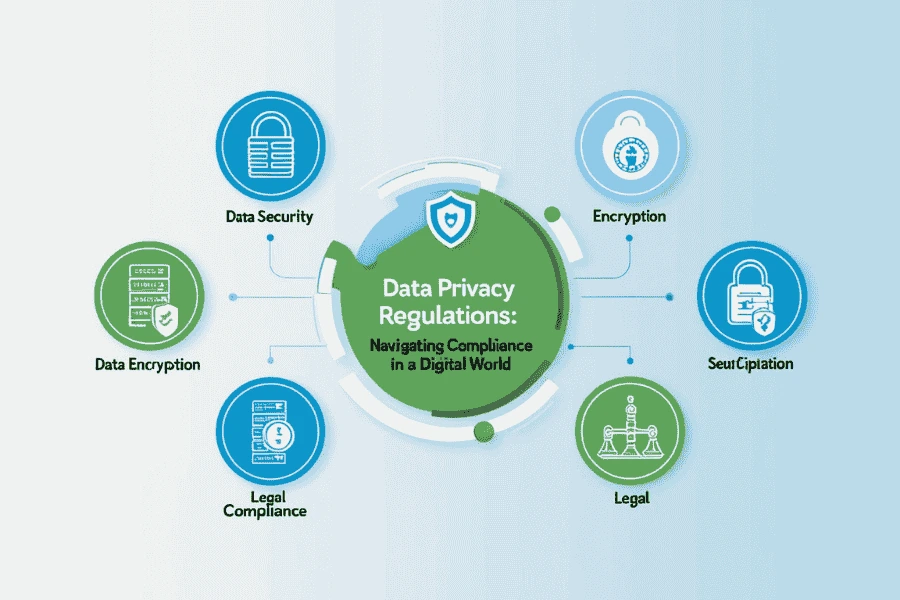Data Privacy Regulations: Navigating Compliance in a Digital World
As data becomes a critical asset in modern business, safeguarding it has become a global priority. Across sectors, companies collect vast volumes of personal and sensitive information from users, customers, and employees. To ensure responsible handling, countries are introducing and enforcing strict data privacy regulations. These laws are designed to protect individuals' rights while holding organizations accountable for how they collect, process, store, and share data. This blog explores the major regulations, challenges, and best practices businesses must understand to navigate compliance successfully in a digital-first world.

Why Data Privacy Matters in the Digital Era
Data privacy isn’t just about compliance—it’s about maintaining trust and transparency in an environment where personal data flows through apps, websites, and connected systems. Mismanagement can lead to identity theft, financial fraud, and reputational damage. Increasing consumer awareness has elevated privacy to a top priority, and companies must show commitment by implementing ethical and legal safeguards.
Overview of Major Data Privacy Regulations
Understanding the major global privacy laws is essential: GDPR (General Data Protection Regulation): Applicable to the EU and companies handling EU citizens' data, GDPR is one of the most comprehensive regulations, requiring transparency, lawful processing, and user consent. CCPA (California Consumer Privacy Act): Empowers California residents with rights to know, delete, and opt out of data sales. PIPL (China’s Personal Information Protection Law): Introduces strict consent and data localization rules for handling Chinese citizens' data. LGPD (Brazil): Similar to GDPR, it outlines rules for data processing, consent, and user rights. PIPEDA (Canada): Governs data collection and use in the private sector with a focus on consent and transparency. Each regulation has its nuances, and businesses operating globally must adapt to comply with multiple frameworks simultaneously.
Core Principles of Data Privacy Laws
While details differ, most privacy laws share core values: Consent and Transparency: Individuals must be clearly informed about how their data is used. Purpose Limitation: Data should only be collected for specified, legitimate purposes. Data Minimization: Only collect data necessary for the intended use. Accuracy and Access: Users should be able to access and correct their data. Storage Limitation: Retain data only for as long as necessary. Security and Integrity: Ensure data is protected from unauthorized access, loss, or damage. Accountability: Organizations must demonstrate compliance and take responsibility for data handling practices.
Challenges in Compliance Implementation
Many businesses struggle with compliance due to: Data Silos: Information scattered across systems makes it difficult to track or manage. Legacy Systems: Older infrastructure may lack built-in privacy features. Cross-Border Data Flows: Different regulations apply in different regions, complicating operations. Third-Party Risk: Vendors and partners with access to user data can introduce non-compliance risks. Limited Resources: Small and mid-sized companies may lack the legal or technical expertise to maintain compliance continuously.
Role of Technology in Achieving Compliance
To address these challenges, businesses are turning to technology-driven privacy solutions: Data discovery and classification tools to locate personal data across systems. Encryption and anonymization to protect data at rest and in transit. Consent management platforms to capture and store proof of user consent. Automated compliance monitoring to detect policy violations. Incident response systems for timely breach notifications and remediation. These technologies help ensure organizations comply consistently and respond quickly to regulatory demands.
Privacy by Design and Default
A key concept in modern regulations like GDPR is Privacy by Design—building privacy into systems and products from the ground up. This includes: Collecting the minimum amount of data needed. Embedding encryption, anonymization, and access controls from the start. Ensuring privacy settings default to the most protective options. Conducting Data Protection Impact Assessments (DPIAs) for high-risk processing activities. This proactive approach reduces risk and improves user confidence.
Penalties and Consequences of Non-Compliance
Failure to comply can result in severe financial penalties and brand damage: GDPR fines can reach €20 million or 4% of global revenue. CCPA violations can cost up to $7,500 per incident. Companies that suffer breaches often face class-action lawsuits, customer churn, and media backlash. More than just fines, non-compliance can erode trust and impact long-term business sustainability.
Building a Culture of Privacy
Achieving compliance isn't just a technical effort—it requires cultural transformation. Key steps include: Training employees on data protection principles. Appointing Data Protection Officers (DPOs). Conducting regular audits and reviews. Involving legal, IT, marketing, and executive teams in privacy strategy. Adopting privacy-first communication with customers and partners. A culture of privacy ensures data protection becomes part of the organization's DNA—not just a checkbox.
Conclusion
In the digital age, data privacy is not optional—it’s foundational. With regulations evolving and users demanding more control over their information, companies must stay ahead by designing compliant systems, adopting robust technologies, and fostering internal awareness. By prioritizing data privacy, organizations don’t just avoid legal trouble—they earn loyalty, build brand equity, and thrive in a data-driven economy.
Active Events
Best Tips to Create a Job-Ready Data Science Portfolio
Date: Aug 06, 2025 | 7:00 PM(IST)
7:00 PM(IST) - 8:10 PM(IST)
2811 people have registered
Transforming Development: The AI Edge in Full Stack Innovation
Date: Aug 07, 2025 | 7:00 PM(IST)
7:00 PM(IST) - 8:10 PM(IST)
2811 people have registered
Bootcamps
Data Science Bootcamp
- Duration:4 Months
- Start Date:Aug 09, 2025
Full Stack Software Development Bootcamp
- Duration:4 Months
- Start Date:Aug 09, 2025
